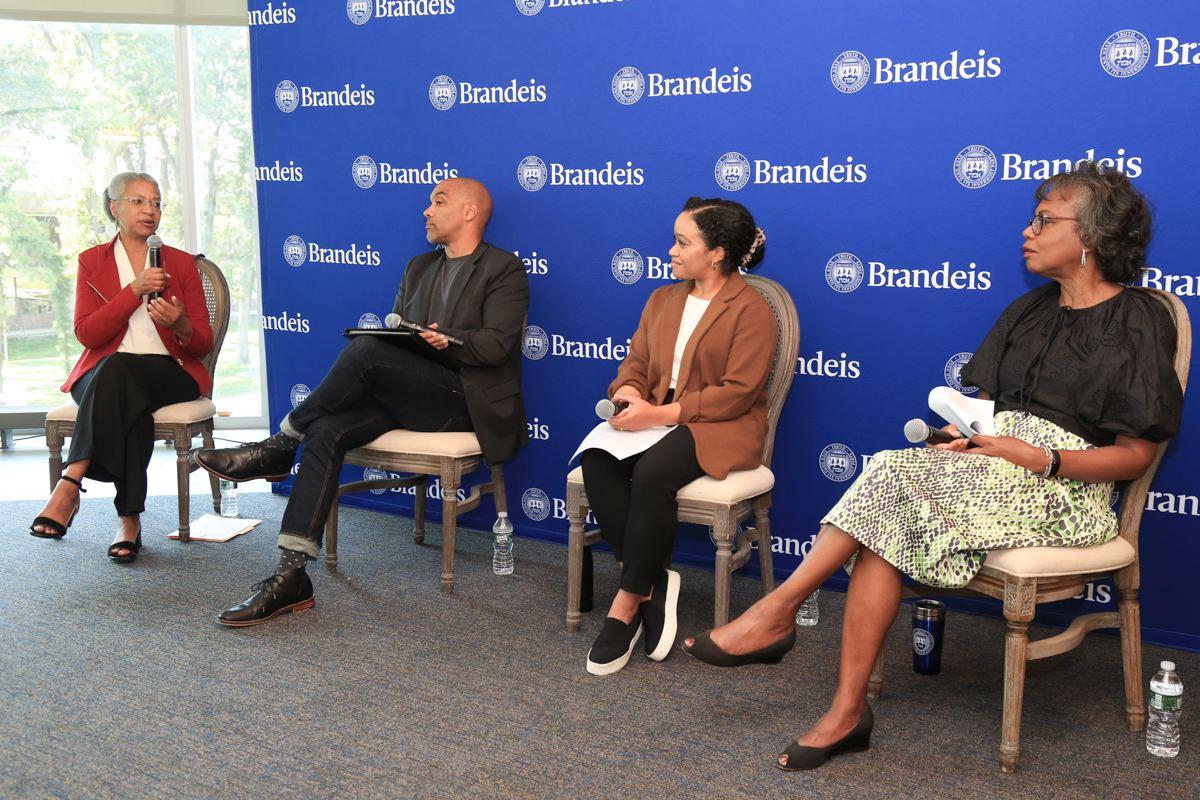“For me, the issue is not affirmative action, it’s not even diversity,” says University Professor of Social Policy, Law, and Women's, Gender and Sexuality Studies Anita Hill. “It’s about inclusion and full participation in every aspect of our society.”

On Thursday, September 21st, the African and African American Studies Department and the Heller School for Social Policy and Management brought together three experts to discuss The Future of Affirmative Action. After a brief introduction by moderator Maria Madison, Interim Dean of the Heller School, each panelist had the opportunity to share their thoughts on the historical, political and legal implications of the United States Supreme Court's June 29, 2023 decision to end affirmative action in college admissions.
Chad Williams, Samuel J. and Augusta Spector Professor of History and African and African American Studies, began the discussion by recounting his arrest during a protest in defense of affirmative action while he was a student at UCLA. The protest came in response to Proposition 209, which prohibited affirmative action in California, and as a result, UCLA was seeing a decline in black student enrollment, which led Williams and his student group to advocate for their university to defy what they considered an immoral law. He also stressed that affirmative action is a moderate response aimed at rectifying historical injustices.
Williams went on to provide historical context to affirmative action, dating back to JFK's Executive Order 10925, which aimed to ensure employers took affirmative action to treat their employees fairly, and stressed that throughout its history, affirmative action has faced opposition.
“Modern conservatism, as a social movement, emerging in the late 1960s and early 1970s… was fueled in large part by laws and social policies enacted as a result of civil rights movements,” Williams says. “Continuing throughout the 1980s, the idea of reverse racism became a potent tool in the conservative arsenal against affirmative action… This historical background and context is to say that the recent Supreme Court decision has to be understood in a broader historical continuum as part of larger efforts both to destroy and preserve affirmative action.”
Panelist Amber Spry, Assistant Professor of African and African American Studies at Brandeis University, built upon Williams’ historical context and drew attention to some of the political strategies underpinning the efforts to overturn affirmative action and what it tells us about the direction of the country.
“When we observe how these familiar strategies are being employed to target not only affirmative action, but other forms of institutional efforts to remedy racial bias,” says Spry, “a concerning story emerges about the vitality of anti-discriminatory policy, the fragility of DEI framings, the co-opting of identity that pits historically underserved groups against one another, and our collective need to imagine potentially new paths forward.”
Dr. Anita Hill shared her perspective on the overturn of affirmative action, noting that the Supreme Court's decision failed to address some of the plaintiff’s complaints, underscoring that the decision was a strategic move, part of a broader effort to restrict underserved from the workforce and voting.
“The sweep of the court’s reliance on race neutrality as the antidote to racism is much broader than university admissions. It is even broader than educational institutions altogether. The abandonment of DEI efforts is likely to spread to industry workplaces; it already has, in fact… the signs are that the law is on course to produce a new version of separate and unequal educational, work, and voting experiences.”
Hill concluded by pointing out that the current moment, created by Supreme Court decisions and regressive policies, ironically presents an opportunity for collective action.
Interim Dean Maria Madison began the Q&A portion of the session with a question of her own: after teasing out various throughlines that many of the panelists had spoken on, Dean Dr. Madison asked the panelists what they believed to be the root cause behind the overturn of affirmative action and other regressive policies. Panelists discussed the fear of dispossession as a driving force behind opposition to affirmative action, emphasizing the importance of imagining alternative ways of living and being in community. Other questions touched on the issue of students missing out on classroom diversity and explored strategies for engaging with people who misunderstand the nature and intent of affirmative action.
At the close of the panel discussion, Interim Dean Madison encouraged attendees to think about a “solidarity dividend, a way in which we’re stronger together, if we try to fight racism together, and if we all promote this idea of whatever we can do to create equitable access to quality resources is the end game.”
